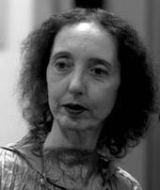
(1969) won the National Book Award
, and her novels Black Water
(1992), What I Lived For (1994), and Blonde
(2000) were nominated for the Pulitzer Prize
.
As of 2008, Oates is the Roger S. Berlind '52 Professor in the Humanities with the Program in Creative Writing at Princeton University
, where she has taught since 1978.
Oates was born in Lockport
, New York
to Carolina Oates, a homemaker, and Frederic Oates, a tool and dye designer.
The worst cynicism: a belief in luck.![]()
Old women snore violently. They are like bodies into which bizarre animals have crept at night; the animals are vicious, bawdy, noisy. How they snore! There is no shame to their snoring. Old women turn into old men.![]()
It is not her body that he wants but it is only through her body that he can take possession of another human being, so he must labor upon her body, he must enter her body, to make his claim.![]()
If you are a writer you locate yourself behind a wall of silence and no matter what you are doing, driving a car or walking or doing housework — you can still be writing, because you have that space.![]()
When people say there is too much violence in [my books], what they are saying is there is too much reality in life.![]()
Our enemy is by tradition our savior, in preventing us from superficiality.![]()
When poets — write about food it is usually celebratory. Food as the thing-in-itself, but also the thoughtful preparation of meals, the serving of meals, meals communally shared: a sense of the sacred in the profane.![]()
If food is poetry, is not poetry also food?![]()
Prose — it might be speculated — is discourse; poetry ellipsis. Prose is spoken aloud; poetry overheard. The one is presumably articulate and social, a shared language, the voice of "communication"; the other is private, allusive, teasing, sly, idiosyncratic as the spider’s delicate web, a kind of witchcraft unfathomable to ordinary minds.![]()

